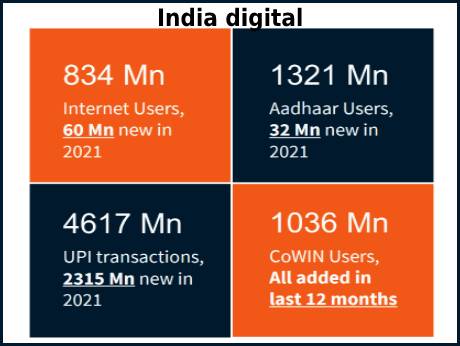
Added $30 bn in revenues in FY 2022 and nearly 450,000 jobs
New Delhi, February 15, 2022: The Indian technology sector is estimated to witness a growth of over 15% in FY 2022, says NASSCOM, the National Association of Software & Services Companies in its Strategic Review 2022 showcasing key trends that shaped 2021.
The Indian technology industry crossed the $200 billion revenue mark, reaching $227 billion revenue in FY 2022, witnessing a $30 billion incremental revenue in the year with an overall growth rate of 15.5%. Recording the highest ever growth since 2011, all sub-sectors of the industry recorded double-digit growth across.
Exports (including hardware) recorded a growth of 17.2% clocking revenue of $178 bn which is over 51% share of India’s total services exports. India’s massive digital infrastructure played a key role in driving India’s tech adoption with public digital platforms becoming the bedrock of India’s digital advantage.
Propelled by this enhanced domestic demand, the domestic revenue of the technology industry recorded a 1.2X growth over FY2019 to reach about $50 billion. Ecommerce recorded a growth of 39% to reach $79 billion in 2021-22. Digital revenue share stood at 30-32%, recording an incremental revenue of $13 billion in FY2022E.
Says Rekha M. Menon, Chairperson, NASSCOM:“Fiscal 2022 has been a breakthrough year for the Indian technology industry. We’ve posted solid, broad-based growth, massively increased jobs, and are proud that we continue to be an engine for India’s economic growth, and a beacon for inclusion and diversity. We are excited about the opportunities in the Techade as we enter an era of exponential transformation and technology becomes indispensable to progress. We remain committed to catalysing the trillion-dollar digital economy with our focus on talent, technology, collaboration, and innovation.”
India –Digital Talent Nation
India has emerged as a global hub for digital talent with over 5 million tech workforce. The industry recorded nearly 10% estimated growth in direct employee pool in FY2022E with a highest-ever net addition of approximately 450,000 to its employee base. With 1 out of 3 employees already digitally skilled, the digital tech talent pool is at 1.6 million, growing at a CAGR of 25%. With massive focus on reskilling and upskilling, the Indian tech industry reskilled approximately 280k employees in FY2022. With over 36% of women employees, the Indian tech industry is one of the largest private-sector women employer in India with over 1.8 mn women in the workforce.
Rapid Strides in Innovation and Transformation Capabilities
The Indian technology industry has emerged as a digital tech hotbed with 30-32% revenues emanating from the digital stream and over 66% of deals largely digital. The industry also undertook over 290 M&As with their primary focus as digital. India continues to be the 3rd largest start-up hub in the world with over 25,000+ tech start-ups and witnessing 42 new unicorns and 11 IPOs in the year 2021. Over 2250 tech start-ups were founded in 2021 and a total highest-ever funding of $24 bn was raised in 2021. The industry also witnessed maturity in the software products segment with the presence of over 2000 software product companies and 1000 SaaS companies in India. Indian SaaS-based companies also secured $4.5 bn funding in 2021. With a massive focus on IP Creation, India ranked 46th in Global Innovation Index. The tech industry filed over 138K tech patents in India during 2015-2021 and increased its investments in R&D by nearly 1.5X across the spectrum. Indian Tech industry has emerged as the leader in seamlessly transforming to hybrid work models. With over 70% of tech organizations looking at adopting hybrid work models, industry has set global standards on Virtual screening, recruitment, onboarding, and training making it a business-as-usual norm.
Adds Debjani Ghosh, President, NASSCOM, said, “2021 has been a great run for the year with our combined revenue crossing $200 bn. While exports did play a large part in this growth, domestic market emerged as a great propeller, nearing a total of $50 bn owing to India’s tech adoption with public digital platforms like Aadhaar, UPI and CoWIN playing a large part in delivering citizen services. FY2022 will be a milestone growth year for the industry. NASSCOM will continue to focus on priorities and play its role in catalyzing the trillion-dollar digital economy through accelerated industry growth and building thought leadership. Leading the industry transformation narrative of Think Digital Think India, the industry will maximize tech innovation and impact and build on future readiness with the Digital Next priority of the industry.”
FY2022-23: Growing from strength to strength
Despite headwinds like geopolitics, macroeconomy fluctuations, supply chain disruptions, and the after-effects of the pandemic, the industry will continue to display grit, resilience and agility. According to the NASSCOM Tech CEO Survey 2022, over 70% CXOs believe that FY2023 is poised to be another growth year for the industry. The current demand trends on technology spending and economic growth point to a positive outlook on technology spending and hiring. The industry has also set itself an ambitious target of $350 bn by FY2026 growing at a rate of 11-14%.
Innovation and Partnerships across the ecosystem will accelerate digital capabilities leading to higher investment in R&D, building products and platforms. While Cloud, Cybersecurity, Data and AI will continue to be top tech priorities for the industry, Centres of Excellence will be set up in emerging areas like quantum technologies. Positive revenue growth will be driven by strong deal pipelines with the industry witnessing larger proportion of smaller deals for niche differentiated products, enhanced digital demand and high tech spends in Pharma/Healthcare, BFSI, Manufacturing, Retail/eCommerce verticals in 2022. Industry will continue with its ‘Employee First’ approach, aggressively working on priorities like attracting and retaining talent, ramping up hiring for skill and scale especially for digital, campus and non-engineering talent. Hybrid models of working will continue to stay depending on individual company policies and job role requirements.